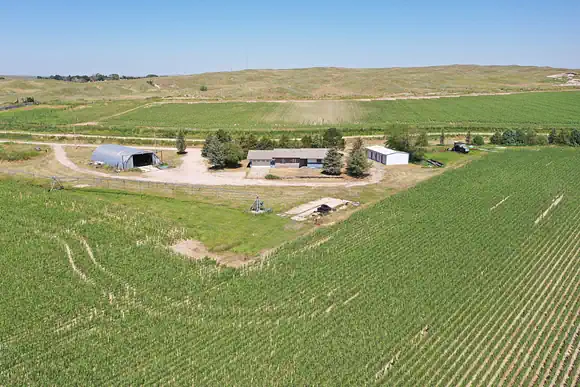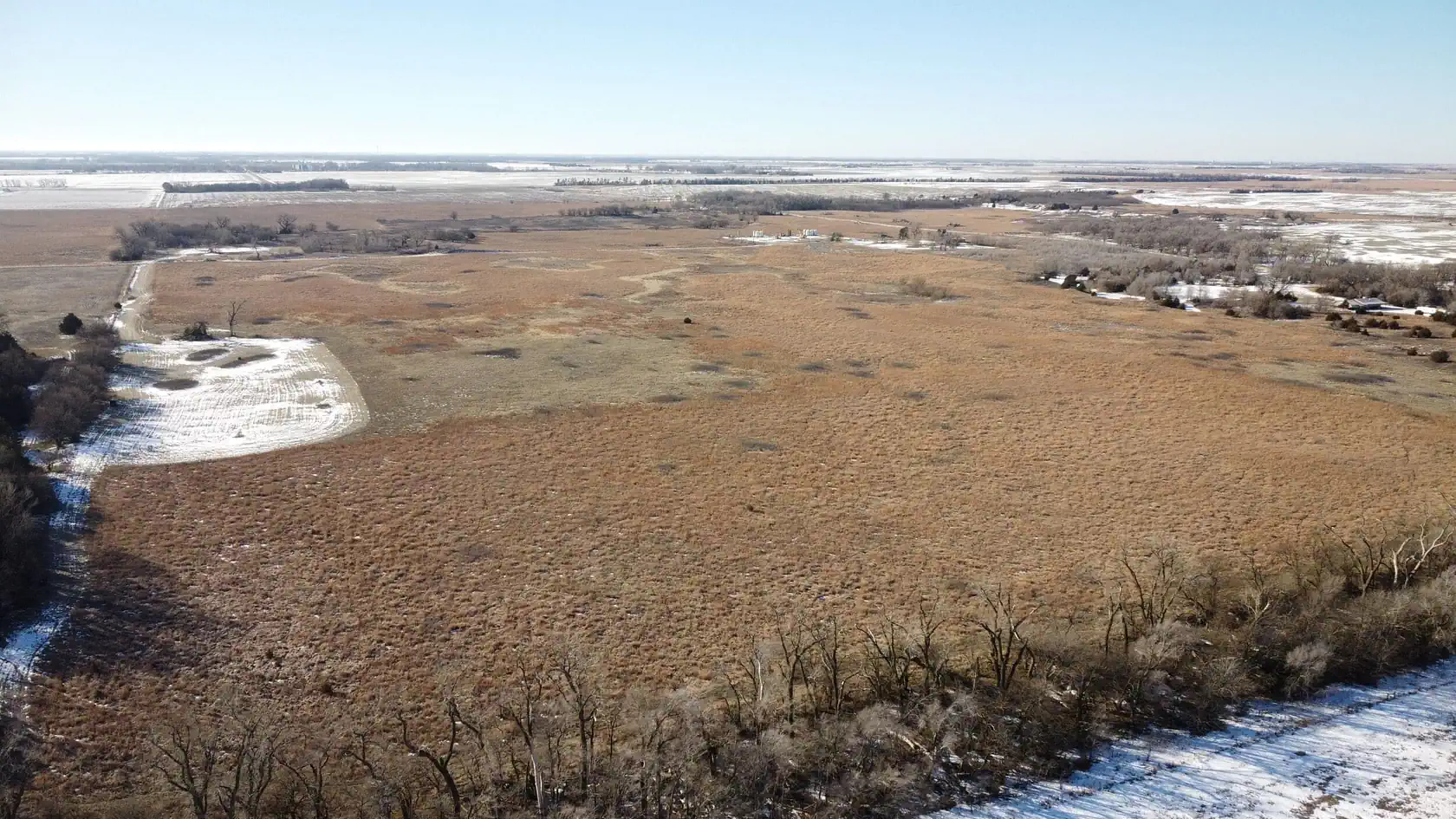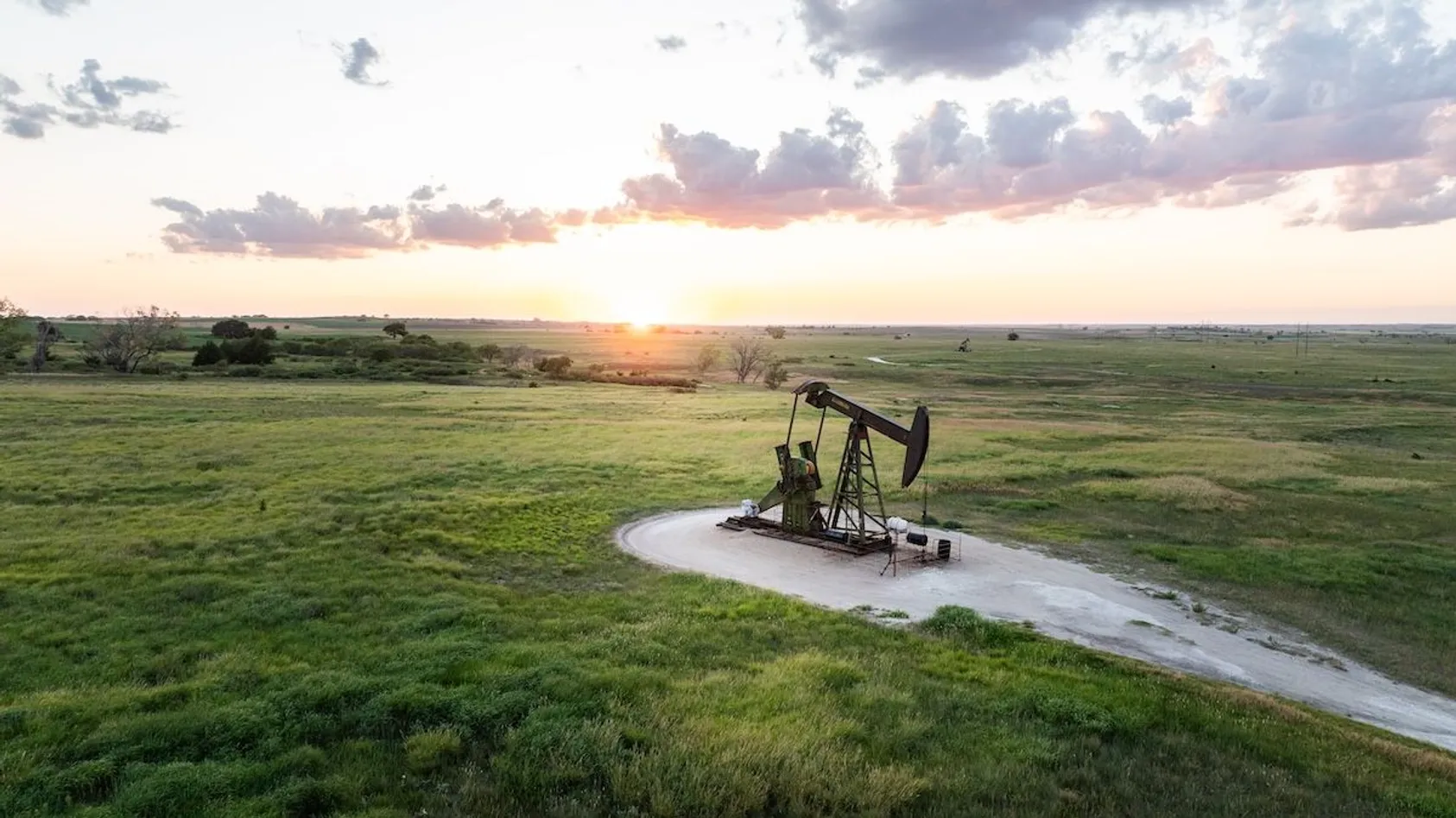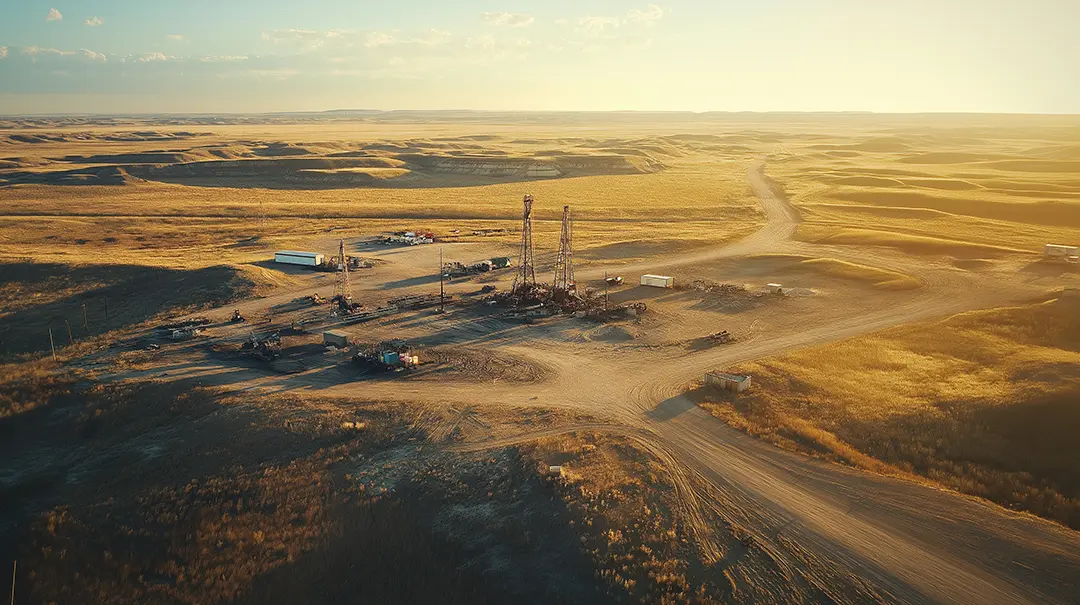But if you’re not sure how it all works, you’re not alone. Whether you’re thinking about buying property, leasing your mineral rights, or figuring out what you’ve inherited, understanding the rules behind Nebraska mineral rights can save you time, money, and confusion.
In this article, we’ll focus on how mineral rights work in Nebraska, what they include, and how you can make smart decisions whether you’re a landowner or an investor.
Does Nebraska Have Mineral Rights?
Yes, Nebraska recognizes mineral rights as a legally distinct form of property ownership. That means you can own or lease the subsurface minerals, like oil, gas, or sand, even if you don’t own the surface land above them.
This separation, known as severed mineral rights in Nebraska, allows individuals, companies, or heirs to claim and manage underground resources without holding title to the land.
The Nebraska Department of Natural Resources (DNR) and the Nebraska Oil and Gas Conservation Commission (NOGCC) oversee mineral extraction and Nebraska oil and gas leasing processes. Under state law, mineral rights ownership in Nebraska can be sold, leased, or inherited just like surface property. Owners often earn income from royalty interests in Nebraska when their minerals are extracted and sold.
This structure creates investment opportunities, but it also requires you to be aware of Nebraska mineral leasing process rules, oil exploration procedures, and Nebraska energy law.
With this knowledge, you can protect your Nebraska landowner rights, especially when dealing with oil field development or eminent domain and mineral rights conflicts.
How Do Mineral Rights Work in Nebraska?
Mineral rights in Nebraska operate as a separate property interest that you can own, lease, or transfer independently from surface rights.
When you control mineral rights, you hold the legal authority to explore, extract, or license underground materials such as shale gas, natural gas, or crude oil. This gives you the right to participate in Nebraska oil production or receive Nebraska oil royalty payments if extraction occurs on your land.
Ownership is typically confirmed through a Nebraska mineral rights title search and documented with a Nebraska mineral deed. Many owners choose to lease these rights to operators through formal agreements governed by oil and gas lease terms Nebraska law requires.
These leases often include Nebraska leasing bonuses and royalties paid to the mineral owner based on production volumes or revenue.
If you’re new to mineral rights ownership in Nebraska, it’s important to consult public records or legal professionals. This ensures you understand your rights, tax obligations, and your role in the Nebraska mineral leasing process.
Mineral Rights vs Surface Rights in Nebraska
In Nebraska, mineral rights and surface rights are two separate legal interests, and they don’t always belong to the same person. If you own the surface, you control how the land is used, like farming, building structures, or conservation efforts. But if you own the mineral rights, you control what’s beneath that surface, like Nebraska fossil fuel resources, sand, or gravel. This distinction is at the heart of many mineral rights disputes in Nebraska.
In some cases, previous owners may have sold or transferred mineral rights to another party, creating what are called severed mineral rights Nebraska law recognizes. This means someone else could lease or extract minerals from your land, even without your consent—as long as they follow Nebraska surface use agreements to limit disruption and provide compensation.
Always verify both property types in a transaction, especially in areas of active Nebraska energy resources and oil exploration in Nebraska.
What are the Major Oil and Gas Fields in Nebraska?
If you own or are considering mineral rights ownership in Nebraska, knowing where these fields are located can help you assess potential opportunities for royalty interests or leasing agreements. Many of these fields are tied to long-standing oil exploration in Nebraska and are monitored by the Nebraska Oil and Gas Conservation Commission (NOGCC).
These oil and gas fields are typically situated in the southwestern and western parts of the state, where geology supports commercial extraction. They often form the basis for Nebraska oil and gas leasing contracts, surface use agreements, and mineral rights valuation assessments in real estate deals.
- Boevau Canyon Field: Located in Hitchcock County, known for historical oil activity.
- Culbertson Field: Offers both oil and gas output, commonly associated with leasing activity.
- Dill East Field: A field with producing wells and potential for extended exploration.
- Dry Creek Field: Active in natural gas extraction and subject to royalty interest agreements.
- Hoover Field: A field with steady production and active mineral rights leasing.
- Jones Field: Known for shallow drilling operations and moderate output.
- Kleinholz Field: Features smaller-scale production and localized mineral rights ownership.
- Meeker Canal Field: Often part of multi-party oil and gas lease terms in Nebraska.
- Sleepy Hollow Field: Historically significant and frequently included in Nebraska mineral deeds.
- Terrestrial Field: A newer development with expanding Nebraska oil production potential.
What Is Included in Mineral Rights in Nebraska?
Nebraska mineral rights laws define mineral ownership broadly, encompassing fossil fuels, shale gas, sand and gravel mining rights, and other commercially viable materials. This bundle of rights can be leased, sold, or passed through inheritance as detailed in the Nebraska mineral deed and mineral rights transfer documents.
Mineral rights ownership in Nebraska typically grants you the ability to explore, extract, and profit from these underground resources. You may also lease your rights to third parties through the Nebraska mineral leasing process. These leases include negotiated oil and gas lease terms, royalty rates, and often upfront Nebraska leasing bonuses and royalties. When minerals are extracted, you earn Nebraska oil royalty payments based on your agreement.
However, owning mineral rights doesn’t give you control over the surface land unless you also hold surface rights. This is why understanding surface rights vs mineral rights Nebraska laws is critical. In some cases, operators must rely on surface use agreements to access minerals beneath privately held farmland or residential plots. Additionally, if your rights are severed from the surface, you’ll need to ensure proper documentation through a Nebraska mineral rights title search.
Nebraska mineral rights include all commercially exploitable underground substances recognized by Nebraska energy law and supported by regulatory bodies like the Nebraska Department of Natural Resources (DNR) and NOGCC.
How Do You Find Out Who Owns Mineral Rights in Nebraska?
If you’re looking to identify who owns mineral rights in Nebraska, you need to begin with a structured title search. Mineral rights ownership in Nebraska is not always the same as surface ownership, especially when those rights have been severed in past transactions. These rights are recorded as legal interests and must be traced through property documents filed with the appropriate county office. Before pursuing oil and gas leasing opportunities or considering how to buy mineral rights in Nebraska, it’s essential to verify current ownership through public records.
Most mineral rights are tracked through deed history, mineral rights transfers, and lease records tied to specific parcels of land. This process can help you confirm whether Nebraska mineral rights are still intact, leased out, or already producing royalty interests in Nebraska.
- Start with a property legal description: Use the section, township, and range to locate the exact parcel.
- Visit the county clerk or register of deeds: Search for the mineral deed, lease documents, or severance clauses.
- Conduct a Nebraska mineral rights title search. Review past mineral rights transfers and look for any gaps or liens.
- Check for recorded leases. Determine if Nebraska oil and gas leasing contracts exist that identify a current operator or lessor.
- Contact the Nebraska Department of Natural Resources (DNR). They may have additional records related to Nebraska energy resources or drilling activity in the area.
How to Search for Mineral Rights Records in Nebraska?
Once you understand the importance of knowing who owns Nebraska mineral rights, your next step is to conduct a proper record search. This search allows you to trace legal ownership history and determine whether the rights have been leased, sold, or inherited. This is especially important when dealing with severed mineral rights in Nebraska, where the surface and subsurface may be owned separately.
Performing this type of research ensures you’re working with accurate information before entering agreements, filing for inheritance of mineral rights in Nebraska, or requesting drilling permits in Nebraska. Public records and legal filings are your primary tools for confirming ownership and lease activity.
- Go to the county register of deeds office: Request access to real estate and mineral rights records by parcel number or legal description.
- Look up historical mineral deeds: These will show who has held ownership and whether any mineral rights transfer has occurred.
- Check for oil and gas lease terms Nebraska law requires to be recorded: These documents list lessees, royalty percentages, and lease duration.
- Search severance documents: These show when mineral rights were separated from surface rights.
- Review probate or inheritance filings: These are essential for tracing ownership if rights were passed down.
How Do You Claim Mineral Rights in Nebraska?
To claim mineral rights in Nebraska, you’ll need to prove legal ownership and ensure the rights have not been transferred, forfeited, or abandoned. Whether you’re inheriting rights, purchasing them, or claiming dormant interests, Nebraska mineral rights laws require you to document and record your claim properly. These steps also apply if you’re dealing with oil field development or need to file mineral rights under a newly discovered Nebraska mineral deed.
If you’re acquiring rights through inheritance or an estate, it’s essential to file probate documentation and confirm that the rights weren’t sold in the past. If the claim involves dormant or abandoned rights, Nebraska energy law may require an affidavit of ownership or legal notice to establish your interest.
Here’s a breakdown of the steps you need to follow;
- Verify ownership through title research: Confirm whether your name appears on a valid Nebraska mineral deed.
- Check for severed mineral rights Nebraska records: Ensure the rights weren’t previously transferred or leased.
- File legal documents with the county recorder: Submit any wills, probate orders, or transfer paperwork related to inheritance of mineral rights in Nebraska.
- Update lease agreements if applicable: Notify operators or leaseholders of your claim to royalty interests in Nebraska.
- Consult with an attorney if ownership is contested: This helps resolve mineral rights disputes Nebraska courts may oversee.
How Does Mineral Rights Inheritance Work in Nebraska?
Inheritance of mineral rights in Nebraska follows state property and probate laws. When you inherit these rights, you’re legally receiving ownership of subsurface minerals, such as oil, natural gas, or sand, even if you don’t inherit the surface land. This process is typically documented through probate filings, a Nebraska mineral deed, or an affidavit of heirship, depending on the situation.
If mineral rights were severed by a previous owner, you’ll inherit only the subsurface interest. That’s why confirming title through a Nebraska mineral rights title search is essential. You may need to update lease agreements or notify existing lessees. Mineral rights ownership in Nebraska often comes with the potential for income, especially through Nebraska leasing bonuses and royalties or long-term royalty interests in Nebraska oil and gas production.
To legally secure inherited rights, you must file ownership documents with the local register of deeds. This also ensures proper tracking under Nebraska mineral rights laws and facilitates any future mineral rights transfer or leasing activities.
How are Mineral Rights and Leases Taxed in Nebraska?
In Nebraska, mineral rights and lease income are subject to both property and income taxation. When you own producing mineral rights, meaning your property generates revenue through oil or natural gas extraction, you are typically liable for income tax on royalty payments and leasing bonuses. Additionally, the mineral estate itself can be assessed for property taxes if separated from surface rights.
The state imposes severance taxes on extracted resources, which are paid by producers but indirectly affect mineral owners. If you hold royalty interests in Nebraska, those payments must be reported on your state and federal tax returns. Inheritance of mineral rights in Nebraska may also trigger estate tax obligations, depending on the value of the rights and the overall estate.
Leased mineral rights often require special reporting to account for Nebraska oil royalty payments and Nebraska leasing bonuses. It’s also wise to monitor local changes in Nebraska energy law or real estate codes, which may impact how mineral rights are assessed or valued.
How Much are Mineral Rights Worth in Nebraska?
The value of Nebraska mineral rights depends on multiple factors such as location, production status, lease terms, and market demand. If you’re evaluating mineral rights ownership in Nebraska, understanding how different elements affect pricing can help you make informed decisions about leasing, selling, or acquiring rights. Mineral rights valuation Nebraska authorities and private assessors often rely on recent lease activity, well productivity, and royalty rates to estimate worth.
Producing properties typically command higher prices due to established Nebraska oil production or Nebraska natural gas production. Non-producing properties, on the other hand, may hold speculative value based on potential development. If a lease is in place, you may also benefit from Nebraska oil royalty payments and Nebraska leasing bonuses and royalties.
Whether you’re assessing severed mineral rights Nebraska recognizes or mineral rights included in farmland, it’s important to factor in royalty interests, drilling permits, and land use agreements tied to Nebraska land ownership rights and the Nebraska mineral leasing process.
How Much Are Mineral Rights Worth Per Acre in Nebraska?
On average, mineral rights in Nebraska are worth between $250 and $1,500 per acre, depending on whether the property is leased, producing, or undeveloped. Leasing value is typically lower for non-producing properties, while active wells that generate Nebraska oil and gas rights income can significantly raise the price per acre. Royalty interests in Nebraska, particularly in high-output fields, can push values to the upper end of the range.
Leasing mineral rights value is generally based on bonus payments and negotiated royalty rates. These may include upfront cash offers and 12.5% to 18.75% royalty shares from future production under standard oil and gas lease terms Nebraska law permits.
Non-producing mineral rights value often reflects speculative pricing and access potential. These are still bought and sold, particularly if located in known fields or near current oil field development in Nebraska.
Producing mineral rights value factors in existing wells, revenue history, and active Nebraska oil royalty payments, making them more attractive to buyers and investors.\
How to Buy Mineral Rights in Nebraska?
If you’re interested in how to buy mineral rights in Nebraska, the process requires careful research, legal documentation, and attention to both state regulations and property-specific conditions. Acquiring Nebraska mineral rights can be a smart move, especially if the property sits in an active production zone or near oil exploration in Nebraska. Whether you’re purchasing severed rights or rights included in a larger Nebraska real estate and mineral rights transaction, each step must be handled precisely.
- Identify potential properties: Focus on parcels with documented Nebraska energy resources or historical oil production.
- Conduct a Nebraska mineral rights title search: This confirms current ownership and checks for liens or active leases.
- Hire a landman or attorney: Professionals help you navigate the Nebraska mineral leasing process and avoid mineral rights disputes.
- Negotiate the purchase price: Consider factors such as royalty interests, existing lease agreements, and acreage value.
- Draft a Nebraska mineral deed: This legal document records the transfer and is filed with the county clerk.
- Verify compliance with Nebraska mineral rights laws: Ensure the transaction adheres to state statutes and includes any surface rights vs mineral rights Nebraska conditions.
- File documents officially: Finalize the mineral rights transfer Nebraska requires by recording your ownership with the appropriate register of deeds.
How to Sell Mineral Rights in Nebraska?
If you’re considering selling your Nebraska mineral rights, the process involves more than just agreeing on a price. You’ll need to verify ownership, understand the current market, and ensure compliance with Nebraska mineral rights laws. Whether your interest lies in producing wells or undeveloped land, your ability to sell will also depend on whether the mineral rights are severed or part of full land ownership. Accurate valuation, clear documentation, and formal legal steps are essential for a successful transaction.
Before listing your mineral rights, make sure your title is clean, and that you’re aware of any existing leases or royalty interests in Nebraska. Buyers will typically require full transparency, especially regarding Nebraska oil and gas leasing agreements or prior Nebraska leasing bonuses and royalties paid to you.
- Confirm ownership through a Nebraska mineral rights title search: This ensures you have legal authority to sell and clears up potential mineral rights disputes.
- Evaluate current market value: Work with professionals to determine mineral rights valuation Nebraska averages for producing, non-producing, or leased acreage.
- Gather legal documentation: Have a valid Nebraska mineral deed and lease records (if applicable) ready for inspection.
- Disclose active leases or royalty agreements: Include any ongoing royalty interests in Nebraska to avoid issues after the sale.
- Negotiate terms with potential buyers: This could include individuals, energy companies, or brokers involved in Nebraska real estate and mineral rights markets.
- Use a mineral rights transfer agreement: Ensure legal transfer following state-specific guidelines for Nebraska mineral leasing process and title updates.
- File the transfer with the county: Submit the mineral deed and supporting documents to the local register of deeds to finalize the sale.
How to Transfer Mineral Rights in Nebraska?
Transferring mineral rights in Nebraska typically involves legal documentation, public recording, and adherence to property laws that govern both surface and subsurface ownership. Whether you’re gifting mineral rights, selling them, or passing them through inheritance, the transfer must be clearly documented in a Nebraska mineral deed and recognized by local authorities. If the rights are severed, it’s especially important to specify the exact nature of the transfer—whether it includes all or only a portion of your interest.
To transfer mineral rights in Nebraska, here’s what to do;
- Review your mineral ownership documentation: Confirm your interest with a recent title search or mineral deed.
- Prepare a new Nebraska mineral deed: This legal document specifies the party receiving the rights, the nature of the transfer, and the legal land description.
- Include royalty interests if applicable: If the rights include producing wells, make sure Nebraska oil royalty payments and other obligations are properly addressed.
- Notarize the deed: Signatures must be witnessed and notarized according to Nebraska mineral rights laws.
- File the deed with the appropriate county clerk: This step officially records the mineral rights transfer Nebraska law requires.
- Notify leaseholders or operating companies: Inform any party currently leasing or extracting minerals to ensure updates in their records.
- Keep copies for tax and estate planning: Mineral rights transfers may affect property value, inheritance of mineral rights in Nebraska, or severance taxes Nebraska collects.
Conclusion
When it comes to Nebraska mineral rights, you’re not just dealing with what’s under the ground, you’re stepping into a world of contracts, ownership rules, and real earning potential. Whether you’re thinking about buying mineral rights, managing inherited ones, or leasing out your land, each decision comes with real consequences and opportunities.
We’ve covered how these rights can be owned separately from the surface, how leasing works with Nebraska oil and gas rights, and why production can greatly affect mineral value. It’s all connected, oil exploration, sand and gravel mining, lease bonuses, and even tax rules. It might sound complicated at first, but once you get the basics down, it starts to make sense.
If you’re a landowner, investor, or just curious about the value under your land, staying informed is the smartest thing you can do. And luckily, Nebraska has resources like the DNR and NOGCC to help guide you. You’ve got options, and now you’ve got the knowledge, too.
Frequently Asked Questions
Do Mineral Rights Expire in Nebraska?
Nebraska mineral rights do not expire on their own. Once legally conveyed through a Nebraska mineral deed, these rights remain valid indefinitely unless legally transferred or abandoned. However, leased mineral rights may expire if the lease terms are not fulfilled, such as failure to drill within a specified period. Nebraska oil and gas leasing contracts usually include expiration clauses to protect both parties. If no activity occurs and no renewal is executed, the lease can terminate, but mineral rights ownership in Nebraska stays intact.
What Happens To Nebraska Mineral Rights When Someone Dies?
When a mineral rights owner passes away, their interest becomes part of the estate and typically passes to heirs according to a will or Nebraska probate law. Inheritance of mineral rights in Nebraska may involve formal probate proceedings or the recording of an affidavit of heirship. Once ownership is established, the rights can be transferred using a new Nebraska mineral deed. It’s important to update the county records to maintain clarity for future mineral rights transfers or royalty distributions tied to Nebraska oil production.
Can You Sell Land and Keep Mineral Rights In Nebraska?
Yes, you can sell land and retain the mineral rights in Nebraska through a legal process known as severance. This creates severed mineral rights Nebraska law recognizes as separate from surface ownership. You must clearly state this intent in the deed during the sale. Once severed, you maintain control over the underground resources, including Nebraska oil and gas rights, while the buyer receives only the surface estate. This allows you to lease the subsurface rights later or benefit from Nebraska oil royalty payments even if you no longer own the surface.







